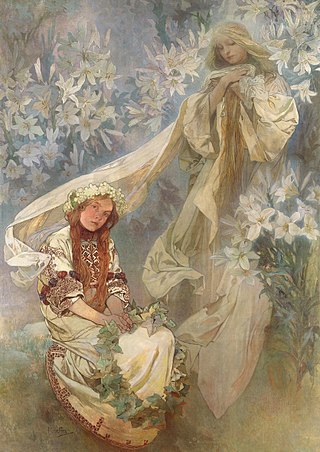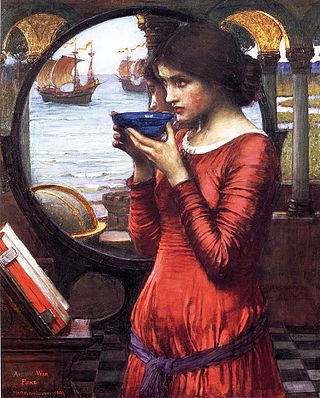Sharon, also spelled Saron, is a given name as well as an Israeli surname.

Chloe, also spelled Chloë, Chlöe, or Chloé, is a feminine name meaning "blooming" or "fertility" in Greek. The name ultimately derives, through Greek, from the Proto-Indo-European root *ǵʰelh₃-, which relates to the colors yellow and green. The common scientific prefix chloro- derives from the same Greek root. In Greek the word refers to the young, green foliage or shoots of plants in spring.

Maeve, Maev or Maiv is a female given name of Irish origin. It comes from the Irish name Méabh, which was spelt Meadhbh in Early Modern Irish, Meḋḃ or Meaḋḃ in Middle Irish, and Medb in Old Irish. It may derive from a word meaning "she who intoxicates", "mead-woman", or alternatively "she who rules". Medb is a queen in Irish mythology who is thought to have originally been a sovereignty goddess.
Fiona is a feminine given name of Gaelic origins. It means white or fair, the Irish name Fíona means vine. It was coined by Scottish writer William Sharp. Sharp may have drawn inspiration from Celtic variations of the name Catherine. Initially, the name was confined to Scotland but later it gained popularity in other countries, such as Liechtenstein, Switzerland, Australia, Germany and Canada.
Kylie is a feminine given name. This name could derive from two different roots:

Holly is an English-language surname and given name.
Ashley is a given name which was originally an Old English surname. It is derived from the Old English (Anglo-Saxon) words æsc (ash) and lēah and translates to "Dweller near the ash tree meadow".

Florence is usually a feminine given name. It is derived from the French version of (Saint) Florentia, a Roman martyr under Diocletian. The Latin florens, florentius means "blossoming", verb floreo, meaning "I blossom / I flower / I flourish". Florence was in the past also used as a translation of the Latin version Florentius, and may be used in this context as a masculine given name.

Jennifer, also spelled Jenifer or Jenefer, is a feminine given name, the Cornish form of Guinevere, that became popular in the English-speaking world in the 20th century.
Rosie is a feminine given name of English origin. It is a diminutive form of the English language given name Rose, which is of Latin origin. Similar diminutives in other languages include: Rosa becoming Rosita in Spanish, and Ruža becoming Ružica in Slavic languages. Rosie is a nickname for names such as Rosalie, Rosemary, Roseanne, Rosalyn, Rosanna, and more. It is occasionally a male nickname, primarily a short form of Roosevelt.

Lily is a feminine given name usually derived from lily, the flower. The name became particularly popular along with other flower names for girls during the 1800s and early 1900s. The lily also has associations with and has been symbolic of innocence and purity in Christian art. Names beginning with or containing the letter L have also been particularly fashionable for girls. It is also occasionally used as a diminutive for other names such as Elizabeth.

Destiny is a primarily feminine given name meaning "destiny", "fate", which is ultimately derived from the Late Latin word destinata. Commonly used spelling variants include Destinee, Destiney, and Destinie.

Jade is a given name derived from the ornamental stone jade, which is used in artwork and in jewellery-making. The name is derived from the Spanish piedra de la ijada, which means "stone of the bowels". There was a belief that when jade was placed on the stomach, it could cure colic in babies. The stone is greatly valued in Asian countries. Confucius believed it had properties encouraging purity, bravery, and honesty. Chinese emperors were buried in suits made of the stone because they believed it would make them live on forever.
Bailey is a given name derived from the surname Bailey. The most likely derivation of the surname is from bailli, the Anglo-Norman equivalent of bailiff.
Alison is a unisex given name in English-speaking countries, traditionally feminine. It was originally a medieval French nickname for Alis, an old form of Alice derived with the suffix -on or -son sometimes used in the former French nicknames. The Middle English form was Alisoun.
Charlotte is a feminine given name, a female form of the male name Charles. It is of French or Italian origin, meaning "free man" or "petite". It dates back to at least the 14th century. Other variants of the name and related names include Charlie, Lottie, Lotte, Karlotta, Carlota, and Carlotta.

Ada is a feminine given name. One origin is the Germanic element "adel-" meaning "nobility", for example as part of the names Adelaide and Adeline. The name can also trace to a Hebrew origin, sometimes spelled Adah עָדָה, meaning "adornment". Ada means "first daughter" among the Igbo People. Its equivalent for "first son" in the same clan is Tahitii and Okpara across all Igbo ethnic group in Nigeria. The Igbo people are one of the largest ethnic groups in Africa. Ada means "island" in Turkish, and it was the 35th most popular girls' name in Turkey in 2016. Finally, the name occurs in Greek mythology and was in use in Ancient Greece.

Emma is a feminine given name. It is derived from the Germanic word ermen, meaning "whole" or "universal". It likely originated as a short form of names such as Ermengarde or Ermentrude. Its earliest use begins at least from the early seventh century, with Frankish royal daughter Emma of Austrasia and the wife of Eadbald of Kent found in written sources. Its popularity in the medieval era increased because it was the name of Emma of Normandy, mother of Edward the Confessor. Emmeline is a Norman variant of Emma that was introduced to England by the Norman invaders in the 11th century. The name is etymologically unrelated to Amalia, Amelia, Emilia, and Emily, all of which are derived from other sources, but all of these names have been associated with each other due to their similarity in appearance and sound. Emma has been used as a short form of some of these names or shares diminutives such as Em or Emmy with them.
Brenda is a feminine given name in the English language.

Goldie is a nickname or given name used in reference to an informal English diminutive word for gold or an English version of the Yiddish name Golda or Golde, also meaning gold. It was often used as a pet name for a girl with blonde hair. It is also used as a nickname for formal names such as Marigold. It has a “vintage vibe” for some parents who have considered it. Other commentators note that the name has risen in use for girls along with other names of a similar style that all exude cuteness and promote enjoyment, perhaps in reaction to serious times. The English expression good as gold is often used to describe people who act virtuously and, in the case of children, are well-behaved.











